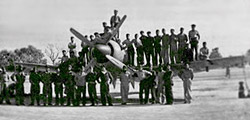 Once it became clear to Pakistan that the Maharaja of Jammu and Kashmir was not going to come to Pakistan, Pakistan permitted her tribesmen led by her Army officers in civilian attire to cross over into Kashmir on 22 Oct 1947 to loot and plunder Kashmir. The tribesmen were well armed with automatic weapons, mortars and flame-throwers. The Maharaja of Kashmir, on 24 Oct 1947, requested the Indian Government for military aid. Indian Government conveyed to the Maharaja that it would be lawful to send the Indian troops to Kashmir only after Kashmir is formally merged with India. By 26th Oct, Kashmir looked undefended and Pak military men were close to Srinagar and were just 50 km away. At this late stage, the Maharaja of Jammu and Kashmir signed the Instrument of agreement. J & K merged with India on 27 Oct 1947 and the unprepared Indian military got indulged into a war.
Once it became clear to Pakistan that the Maharaja of Jammu and Kashmir was not going to come to Pakistan, Pakistan permitted her tribesmen led by her Army officers in civilian attire to cross over into Kashmir on 22 Oct 1947 to loot and plunder Kashmir. The tribesmen were well armed with automatic weapons, mortars and flame-throwers. The Maharaja of Kashmir, on 24 Oct 1947, requested the Indian Government for military aid. Indian Government conveyed to the Maharaja that it would be lawful to send the Indian troops to Kashmir only after Kashmir is formally merged with India. By 26th Oct, Kashmir looked undefended and Pak military men were close to Srinagar and were just 50 km away. At this late stage, the Maharaja of Jammu and Kashmir signed the Instrument of agreement. J & K merged with India on 27 Oct 1947 and the unprepared Indian military got indulged into a war.
The large-scale operations in Jammu and Kashmir were planned, directed and conducted almost entirely by Indian officers. The few British officers still holding some senior engagements in India gave some advice and assistance only in the first few months of the operations. The Indian officers of whom Cariappa was the senior most, had till then little experience in the higher planning and conduct of war. It is a remarkable proof of their high calibre and professional capability that they managed so well the long battle, which took place in exceptionally difficult conditions. The Union Cabinet tasked General Sir Rob Lockhart, the Commander in Chief of the Royal Indian Army and Air Marshal Sir Thomas W Elmhirst, the Commander in Chief of the Royal Indian Air Force to release the state of Jammu and Kashmir from the intruders. Thus, in the very first military campaign forced on India after her Independence and Partition, her totally unprepared armed forces and many civilians gave an account of themselves of which any Nation may feel proud.






































